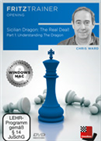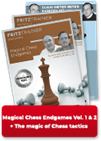Radjabov beats Vachier-Lagrave
Much like their previous final match at the Skilling Open, Magnus Carlsen and Wesley So go into the second day of the confrontation with the score tied. While on that occasion the deciding mini-match was played on Carlsen’s 30th birthday, this time around the four-game ‘set’ will be played on Valentine’s Day.
Meanwhile, in the match for third place, Teimour Radjabov got ahead on the scoreboard against Maxime Vachier-Lagrave, as he won twice with white and lost one of the four games to go into Sunday’s mini-match only needing a draw to get third place.
 Wesley So published two new opening DVDs: 1.b3, the so called Nimzo-Larsen-Attack, for White and his black secrets in the modern Italian. Get them in a package and save money!
Wesley So published two new opening DVDs: 1.b3, the so called Nimzo-Larsen-Attack, for White and his black secrets in the modern Italian. Get them in a package and save money!
Click to enlarge
Carlsen 2 : 2 So
In the first game of the finals, which ended in a draw, So missed a strong move in the opening. For our endgame expert Karsten Müller that was reason enough to start his analysis at this early stage.
Game two was won by Carlsen. Although the rook ending was materially equal, the world champion was able to exploit the advantages of his distant passed pawn. Karsten Müller showed the subtleties.
Select an entry from the list to switch between games
After the third game had ended in a draw, Wesley So managed to level the score in the fourth encounter of the day. Carlsen was not at his best in this game.
So, W. (2770) - Carlsen, M. (2862)
[Besenthal, Klaus-Günther]
1.e4 e5 2.Nf3 Nc6 3.Bc4 Bc5 4.c3 Nf6 5.d4 exd4 6.e5 d5 7.Bb5 Ne4 8.cxd4 Bb6 9.Nc3 0-0 10.Be3 Bg4 11.h3 Bh5 12.Qc2 Bg6 13.Qb3 Ne7 14.0-0 c6 15.Bd3 Nf5 16.Qc2
Up to this point, it has all been played before. 16...Nxc3 But this is new.
[Previously, 16...Nxe3 17.fxe3 Ng3 had been tried.]
17.bxc3 Nxe3 18.fxe3 Bxd3 19.Qxd3 f6 20.c4 Bc7?!
After this move Black is on the back foot.
[It was possible to play 20...fxe5 21.Nxe5 Qd6! with good play for Black, who can go c6-c5 next if White does nothing about it.]
21.cxd5 Qxd5
[21...cxd5?! 22.Qb3]
22.exf6 gxf6
 In this first part, the emphasis is on themes and ideas as the viewer is armed with tactical and positional motifs and concepts after 1 e4 c5 2 Nf3 d6 3 d4 cxd4 4 Nxd4 Nf6 5 Nc3 g6.
In this first part, the emphasis is on themes and ideas as the viewer is armed with tactical and positional motifs and concepts after 1 e4 c5 2 Nf3 d6 3 d4 cxd4 4 Nxd4 Nf6 5 Nc3 g6.
[The alternative 22...Rxf6 23.e4 Qd7 24.e5! might not have pleased Carlsen.]
23.e4
[23.Nh4! was more precise here. Now after 23...Qd6 24.Nf5 Qh2+ 25.Kf2 the queen and bishop construction has lost its power.]
23...Qd7
[23...Qe6! was more precise. The knight on f3 moves to f5 anyway, where it will protect the d4-bishop. So it made sense for Black to increase the pressure on e4.]
24.Rad1 Rad8 25.Nh4 Kh8 26.Nf5
Nevertheless, this position was still defensible for Black. 26...c5?! Not a good move.
[Better was, for example, 26...Qe6]
27.d5! Now White is dominating the board. Black has no more active options, while White could, for example, first advance the a-pawn.
27...Be5 Otherwise d5-d6 could be played.
28.Rb1 b6 29.Qc4 Rfe8 30.Kh1 Bd4 31.Rf4
31...Rxe4! The world champion continues to fight — in search of activity, he gives up an exchange.
32.Rxe4 Qxf5 33.Rbe1 Rxd5? But this loses immediately.
[33...Qxd5 34.Re8+ Kg7 35.R1e7+ Kg6 36.Qd3+ would of course have been comfortably won for White as well; after 33...Be5! Black might also have lost in the long run, but at least the e-file would have been blocked temporarily.]
34.Rg4 h5 [34...Rd8 35.Qf7 or; 34...Be5?? 35.Qxd5 is no longer of any use here.]
35.Re8+ Kh7 36.Re7+ Kh8 37.Qc1!
A final attack in which everything just fit perfectly! 1-0
Radjabov 2½ : 1½ Vachier-Lagrave
The match between Radjabov and Vachier-Lagrave started with a draw by perpetual check in the first game. In the next game, we saw an exciting endgame, which also fascinated Karsten Müller. The endgame expert had good reasons to title his game commentary “Radjabov’s king”.
In the third game, MVL bounced back to tie the score, but the Frenchman was also the one making the last mistake, as a single blunder in game 4 cost him the mini-match:
 In over 4 hours in front of the camera, Karsten Müller presents to you sensations from the world of endgames - partly reaching far beyond standard techniques and rules of thumb - and rounds off with some cases of with own examples.
In over 4 hours in front of the camera, Karsten Müller presents to you sensations from the world of endgames - partly reaching far beyond standard techniques and rules of thumb - and rounds off with some cases of with own examples.
The passive 39...Re6 gave white a large advantage after 40.Bd5 Re7 41.Rxd6. In the diagrammed position, Vachier-Lagrave needed to play 39...Bh3, attacking the rook and giving way for his passive rook along the seventh file — 40.Rf2 Rce7 with counterplay.
Additional reporting by Carlos Colodro
Links
























